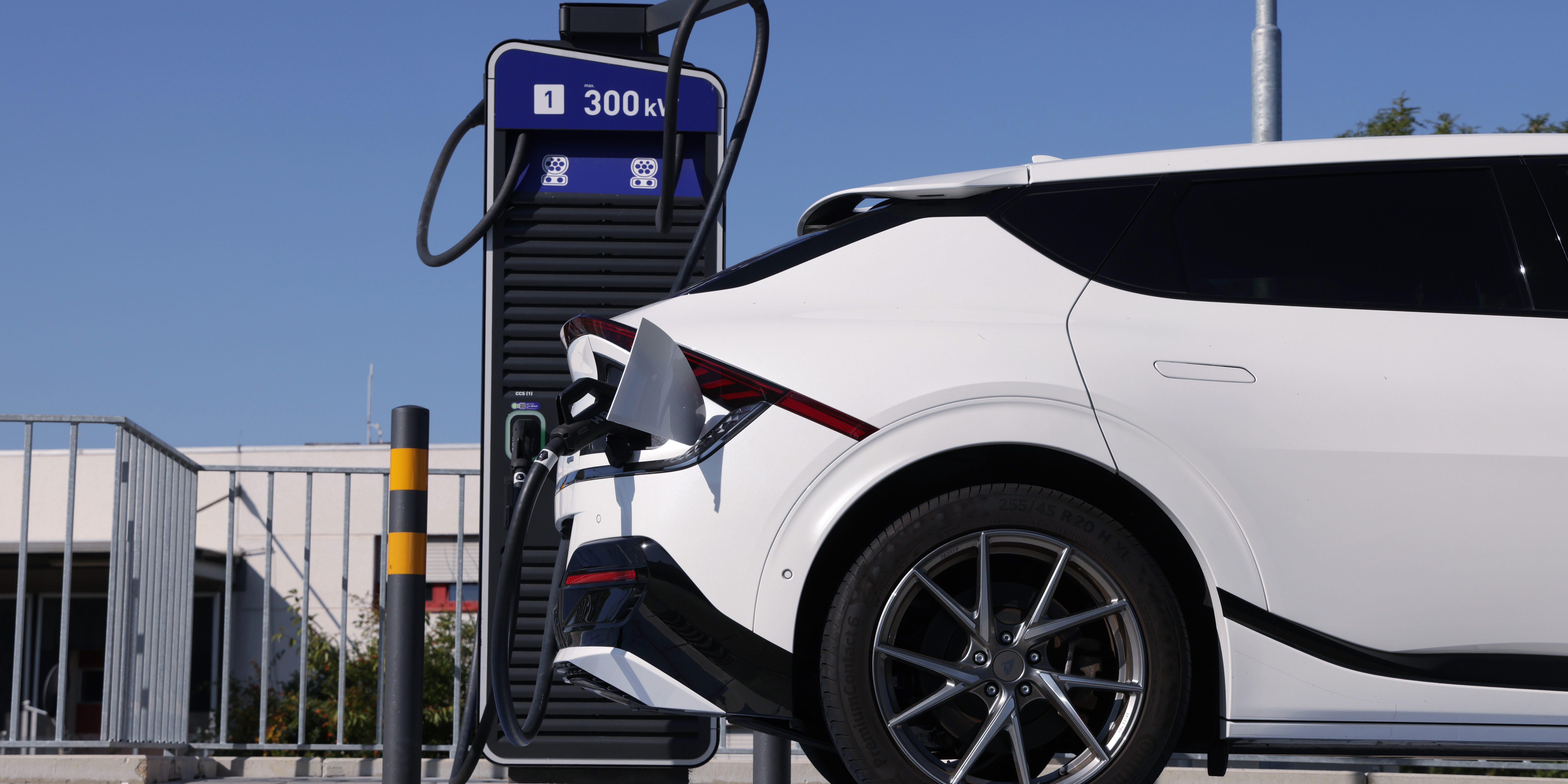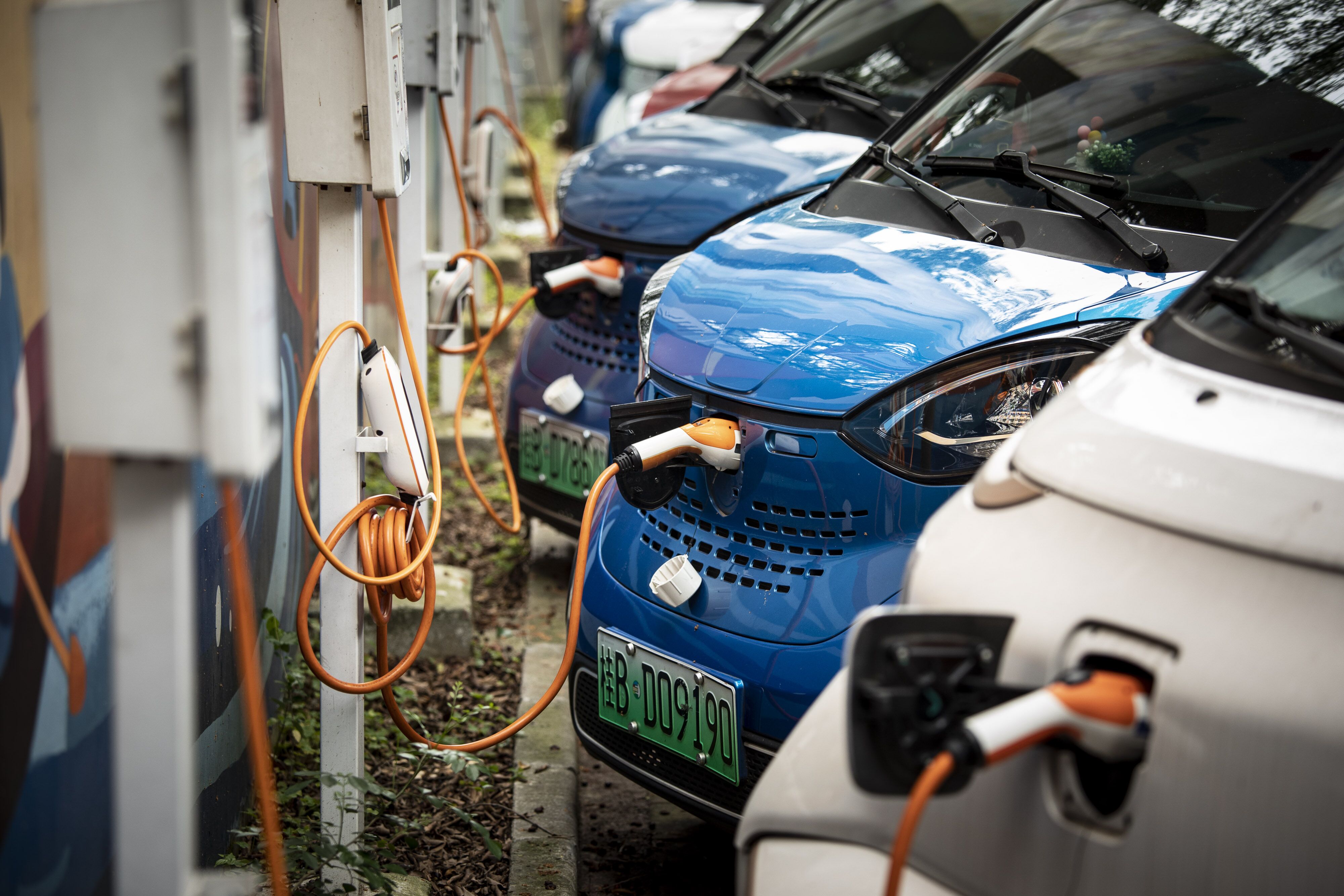More than one in five cars sold worldwide this year is expected to be electric.
But if countries met their announced energy and climate pledges, fully and on time, two in three cars sold would be electric by 2035, according to the latest edition of the International Energy Agency’s (IEA) annual Global EV Outlook.
The latest EV (electric vehicle) outlook, published on 23 April 2024, finds that global electric car sales are set to remain robust in 2024, reaching about 17 million by the end of the year.
In 2024, electric car sales in China are projected to leap to about 10 million, accounting for about 45% of all car sales in the country. In the US, roughly one in nine cars sold are projected to be electric.
 An electric car charges at a public charging station in Eisenberg, Germany. (Photo: Sean Gallup / Getty Images)
An electric car charges at a public charging station in Eisenberg, Germany. (Photo: Sean Gallup / Getty Images)
And in Europe – despite a generally weak outlook for passenger car sales and the phase-out of subsidies in some countries – electric cars are still set to represent about one in four cars sold.
South Africa, unsurprisingly, is way behind, with just 1,080 EVs sold in 2023, in a year where 347,695 new cars were sold, according to the Automotive Business Council.
Read more in Daily Maverick: Unplugged: Why is South Africa so far behind on the race to electrify vehicles?
South Africa’s automotive manufacturing industry is seriously at risk if the country does not transition. The Automotive Business Council (formerly the National Association of Automobile Manufacturers of South Africa) reported that three out of every four vehicles exported were destined for the EU and the UK – which have set bans on the sale of new internal combustion engine vehicles (ICEVs) from 2035.
The lack of policy incentives from the government has been a big reason for South Africa losing the EV race and it is why the release of the Electric Vehicle White Paper at the end of 2023 was so significant.
The white paper, which was approved by Cabinet in December 2023 (it was meant to come out in 2021), aims to ensure South Africa becomes part of the global shift from ICEVs to new-technology vehicles (which include battery electric vehicles and hybrids).
Read more in Daily Maverick: Rapid shift to renewable energy vital for electric vehicle transition, says Minister Patel
“We’ve got to make this transition for climate change purposes. But also for industrial policy purposes,” said Trade, Industry and Competition Minister Ebrahim Patel at the time.
The white paper focuses on building production capability for electric vehicles (phase one) and stimulating the demand for EVs (phase two).
The IEA’s outlook report supports the notion that ongoing policy support – along with substantial investment in the electric vehicle supply chain, and a decline in the price of EVs and their batteries – is expected to expand the EV sector even more in future.
Shifting the energy sector
“Rather than tapering off, the global EV revolution appears to be gearing up for a new phase of growth,” said IEA executive director Fatih Birol. “This shift will have major ramifications for both the auto industry and the energy sector.”
The report finds that under today’s policy settings, every other car sold globally is set to be electric by 2035. But if countries actually met their energy and climate pledges, fully and on time, two in three cars sold would be electric by that year.
The IEA made this projection under its “Announced Pledges Scenario” (meeting climate pledges) based on recent major announcements of electrification targets and longer-term net zero emissions and other pledges – for example, the Zero Emission Vehicles declaration made at COP26, where signatories pledged to ensure that all new car and van sales be zero emission by 2040 globally, and by 2035 in leading markets.
If this scenario is to be met, the rapid acceleration of EVs (cars, trucks, vans, buses) would mean we could avoid about 12 million barrels of oil per day, on par with current demand from road transport in China and Europe combined.
But even if countries didn’t meet their climate pledges and just stuck to existing policies (the “Stated Policy Scenario”), EV stocks could displace six million barrels per day of diesel and gasoline in 2030 – a sixfold increase in displacement from 2023 levels.
“In fact, we expect global demand for oil-based road transport fuels to peak around 2025,” the report stated.
But replacing that energy from oil will have to come from somewhere – and with more EVs to power, more electricity will be needed
In 2023, the global EV fleet consumed about 130 terawatt hours of electricity – which is the same as powering more than 20 million households for a year.
In a country like South Africa, which notoriously struggles with grid constraints and power supply, this will have to be considered.
Anthony Dane, decarbonisation specialist and director of Change Pathways, previously told Daily Maverick: “We have to recognise the energy crisis, but we also must take steps to make a more conducive environment.
“The economics are shifting and we are going to be on the losing end of it,” said Dane, explaining that the levelled cost of transport and the total cost of ownership will shift, and we will end up paying more for ICEVs.
Minister Patel said that while off-the-grid charging was part of the solution and should be encouraged, his department saw it more for early adopters and at a relatively modest scale – and that we would have to integrate charging infrastructure into stable infrastructure that could take a relatively high load factor.
Patel said that while the white paper was not South Africa’s Integrated Resource Plan (which lays out the future of the country’s energy mix), it “makes the argument for a strong shift to more renewable energy”.
Batteries
As electric car sales increase, so does the demand for batteries. The outlook projected that battery demand will grow four-and-a-half times by 2030, and almost seven times by 2035 compared with 2023.
In the Announced Pledges Scenario, the demand is significantly higher, multiplied by five times in 2030 and nine times in 2035.
To put this in context, if countries met their energy and climate pledges in time, by 2035, there could be as much EV battery demand per week as there was in the entire year of 2019.
But the outlook finds that the world’s capacity to produce batteries for EVs is well positioned to keep up with demand, even as it rises sharply over the next decade. The pace of the transition to EVs may not be consistent and will hinge on affordability, the report emphasises.
“The wave of investment in battery manufacturing suggests the EV supply chain is advancing to meet automakers’ ambitious plans for expansion,” said Birol. “As a result, the share of EVs on the roads is expected to continue to climb rapidly.”
Reducing emissions
If you were to buy a car in 2035, an ICE car would produce almost two-and-a-half times the emissions of a battery electric car over the vehicle’s lifetime (15 years of operation, or about 200,000km).
For a medium-sized car, this equates to 38 tonnes of CO2 equivalent over the ICE car lifetime compared with 15 tonnes of CO2 equivalent for a BEV, according to the report.
In the outlook’s Stated Policy Scenario, we could avoid more than two gigatons of CO2 equivalent in 2035 by using EVs rather than ICEV equivalents.
These emissions savings would increase by about five percentage points if countries met their climate and energy pledges, as the grid decarbonised more quickly than in the Stated Policy Scenario. DM
https://www.youtube.com/watch?v=REeWvTRUpMk




 An electric car charges at a public charging station in Eisenberg, Germany. (Photo: Sean Gallup / Getty Images)
An electric car charges at a public charging station in Eisenberg, Germany. (Photo: Sean Gallup / Getty Images) 